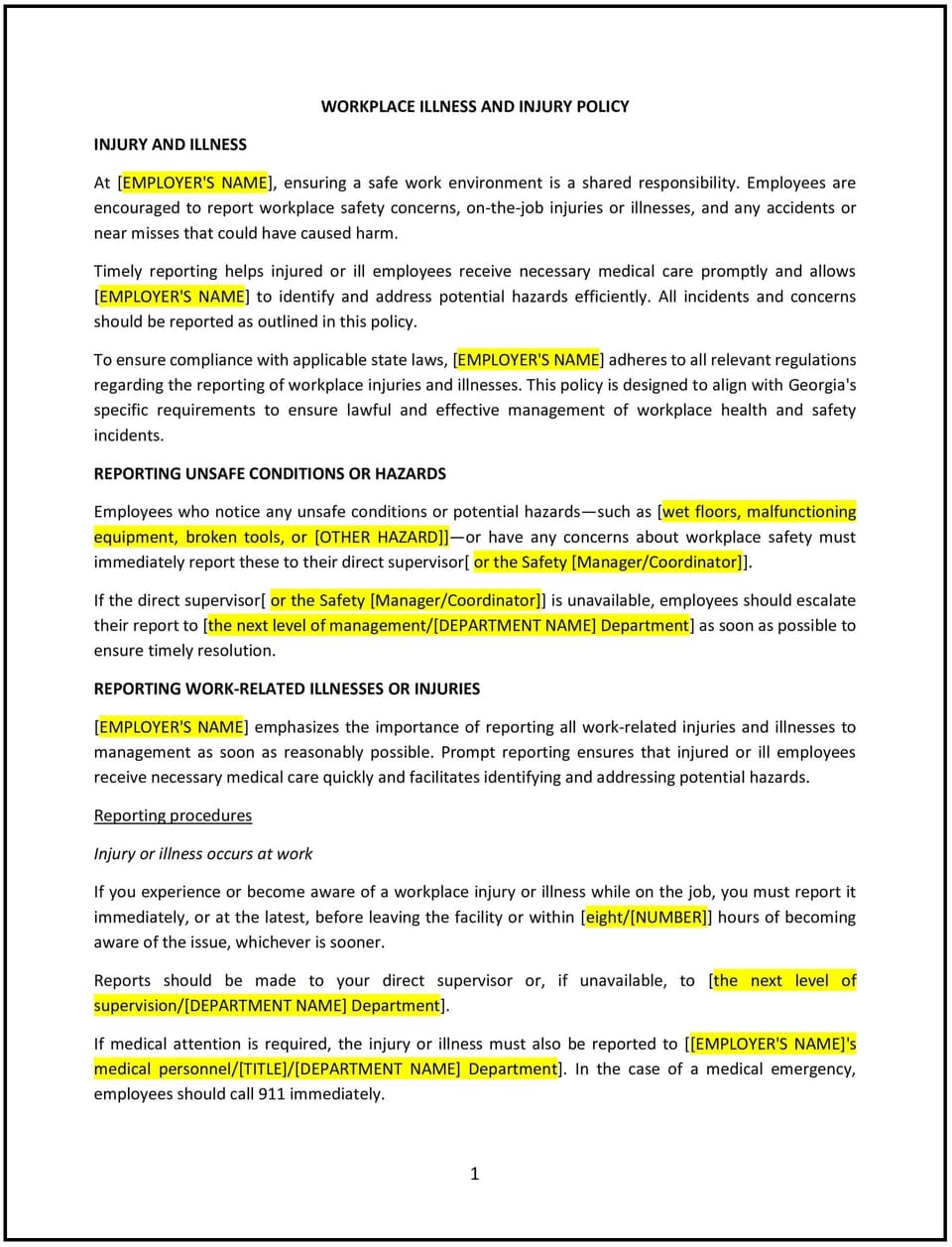Workplace illness and injury policy (Georgia): Free template

Workplace illness and injury policy (Georgia)
This workplace illness and injury policy is designed to help Georgia businesses provide guidance for addressing workplace illnesses and injuries. The policy outlines reporting procedures, preventative measures, and support systems to ensure a safe and healthy environment for employees.
By implementing this policy, businesses can respond effectively to incidents, promote employee well-being, and maintain workplace safety.
How to use this workplace illness and injury policy (Georgia)
- Define illnesses and injuries: Clearly specify what constitutes a reportable workplace illness or injury, including examples such as slips, falls, or exposure to infectious diseases.
- Establish reporting procedures: Require employees to report illnesses or injuries promptly to a designated contact, such as a supervisor or HR representative.
- Provide immediate response steps: Include guidelines for first aid, medical assistance, or emergency services in case of serious incidents.
- Document incidents: Require detailed records of all reported illnesses or injuries, including witness statements and any corrective actions taken.
- Promote prevention: Outline strategies for minimizing workplace risks, such as training programs, regular inspections, and equipment maintenance.
- Support recovery: Specify resources available to affected employees, such as modified duties, paid leave, or access to medical care.
- Review regularly: Periodically assess the policy to ensure it aligns with Georgia-specific safety practices and business needs.
Benefits of using this workplace illness and injury policy (Georgia)
Implementing this policy provides several advantages for Georgia businesses:
- Protects employees: Clear procedures help address illnesses and injuries promptly and effectively.
- Enhances safety: Preventative measures reduce the likelihood of workplace incidents.
- Minimizes disruptions: A structured response ensures business continuity during incidents.
- Builds trust: Employees feel supported and valued when their health and safety are prioritized.
- Reflects Georgia-specific practices: Tailoring the policy to local laws and business environments ensures its relevance.
Tips for using this workplace illness and injury policy (Georgia)
- Communicate clearly: Share the policy with employees during onboarding and provide regular reminders.
- Train staff: Offer ongoing training on recognizing risks, reporting procedures, and using safety equipment.
- Maintain records: Keep thorough documentation of incidents to identify patterns and prevent future issues.
- Encourage a proactive culture: Foster an environment where employees feel comfortable reporting hazards or concerns.
- Evaluate regularly: Use feedback and incident data to refine safety measures and policy guidelines.
Q: What types of incidents should employees report?
A: Employees should report any workplace-related illnesses, injuries, or near-misses, such as falls, cuts, or exposure to hazardous substances.
Q: How should employees report an illness or injury?
A: Employees should notify their supervisor or HR immediately, providing details about the incident and any contributing factors.
Q: What steps should businesses take after an incident is reported?
A: Businesses should assess the situation, provide medical assistance if needed, document the incident, and implement corrective actions to prevent recurrence.
Q: Are employees entitled to leave following a workplace injury?
A: Businesses should outline the leave policies available to employees recovering from workplace injuries, such as paid sick leave or workers’ compensation.
Q: How can businesses prevent workplace illnesses and injuries?
A: Businesses should conduct regular safety training, inspect equipment, and address hazards promptly to reduce risks.
Q: What resources should businesses provide to affected employees?
A: Resources may include access to medical care, employee assistance programs, or temporary modifications to job duties during recovery.
Q: How often should this policy be reviewed?
A: The policy should be reviewed annually or as needed to reflect changes in Georgia workplace safety practices or employee feedback.
This article contains general legal information and does not contain legal advice. Cobrief is not a law firm or a substitute for an attorney or law firm. The law is complex and changes often. For legal advice, please ask a lawyer.


